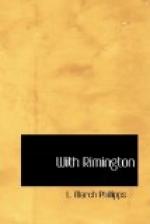“Vice and I crawled to the top of our ridge at last just as morning was breaking. There were bushes and rocks to hide among, and the clouds had all gone, and day broke clear. The deep river ravine lay right below us, and as the light penetrated, the first thing we saw was a small shelter tent with a cart or waggon by the side of it. We grinned and nudged each other and wagged our heads at the discovery, but kept them carefully hidden. Farther west was a detached kopje, the site of a permanent Boer picket, according to the Kaffir; but there was no regular laager. There were no horses grazing about, no cattle, no smoke, none of the usual and inevitable signs. A picket! Yes. Pushed out from Koodoosberg, the big hill which rises abruptly from the plain three or four miles off, but no real occupation. After studying the country yard by yard with our glasses, and making a few notes about the lie of the land and the names and positions of farms, we creep off and get back to camp by mid-day.”
The results of these exciting little prowls, when worth while, are sent in to the General, and from the mass of evidence thus placed before him he is supposed to be able to define the enemy’s position and movements.
Chester Master and our little body were paid a pretty compliment by the General the other day; for the Major having written to ask if we might join him, Methuen replied that he was sorry to have to refuse, but that we were doing invaluable work, and he really couldn’t spare us.
Well, fare you well. We hear of heavy reinforcements arriving. They will be very welcome. Magersfontein, Colenso, Stormberg; we could do with a change. But what a revelation, is it not? Are these the prisoners that we played at dice for? One thing in it all pleases me, and that is the temper and attitude of England. I like the gravity, the quiet, dogged rolling up of the shirt-sleeves much better than the blustering, wipe-something-off-a-slate style which the papers made so familiar to us at the beginning.




